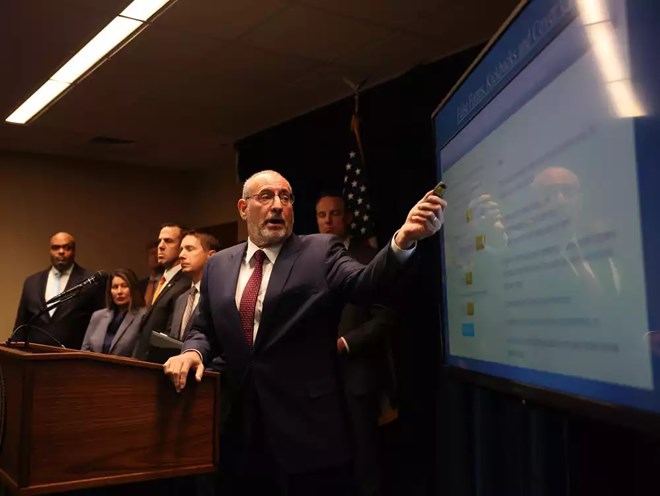
Saturday September 24, 2022

U.S. Attorney for the District of Minnesota Andrew Luger (center) shows off photos on Tuesday of allegedly falsified meal cards as the Feeding Our Future indictments were announced. Many of the defendants will not be held in jail pending trial. Ben Hovland | MPR News
Most of the four dozen people charged in an alleged $250 million scheme to defraud federal child nutrition programs are not being jailed as the sprawling case moves forward. The U.S. Attorney’s Office in Minneapolis says three of the suspects have left the country, but prosecutors still do not consider most of the others to pose a flight risk and have not asked judges to detain them.
Authorities allege that Aimee Bock, who founded a nonprofit called Feeding Our Future, led a conspiracy to bilk taxpayers out of $250 million that was supposed to fund meals for needy children during the pandemic. Investigators say Bock and 47 others set up phony meal sites, filled out fraudulent reimbursement forms, then spent the ill-gotten proceeds on real estate, luxury cars, and travel.
Bock pleaded not guilty Tuesday to all of the charges and walked out of the courthouse after the government did not request that she be detained.
It’s unusual to jail defendants even in major fraud cases, said Mark Osler, a former federal prosecutor who teaches law at the University of St. Thomas. He said detention is typically reserved for people accused in terrorism or narcotics cases.
But Osler said prosecutors will request detention if they believe there’s a flight risk. The U.S. Attorney’s Office says three of the Feeding Our Future defendants, Abdikerm Eidleh, Abdiwahab Aftin, and Fahad Nur, already left the country, and others have tried.
At hearings Thursday, Magistrate Judge David Schultz ordered Abdiaziz Farah and Mohamed Jama Ismail to remain in the Sherburne County Jail.
The FBI seized their passports during raids in January, and authorities say the men — who were business partners — lied on applications for new ones. Agents arrested Ismail at the Minneapolis-St. Paul airport in April as he tried to fly to Kenya. He later pleaded guilty to a passport fraud charge. Farah pleaded not guilty.
Prosecutors also raised concerns after another defendant — Mekfira Hussein — had purchased a one-way ticket to Ethiopia, with plans to leave Tuesday, the day the indictments were announced. Among other things, Hussein is alleged to have written a $93,000 check to a Porsche dealer with stolen money.
But Schultz ordered Hussein and two other defendants to be released after they assured the court that they’d handed over their passports. The judge warned Hussein that if she tried to flee, law enforcement would “spare no effort to find you and then have you brought back.”
After the hearing, Hussein’s attorney Jason Steck said his client never posed a flight risk and had planned the trip weeks ago after learning that her father-in-law was ill.
“There was no intent to flee the country at all. She was going to visit a sick relative,” Steck said. “And when she found out that the FBI had visited her residence [when] she wasn’t home, she called me, and then she called the FBI and immediately voluntarily turned herself in.”
But the case was more complicated for another defendant. Liban Yasin Alishire is accused of stealing $1.6 million and spending some of it on luxury property in Kenya.
At a lengthy detention hearing, IRS agent Aaron Daniels testified that when he went to Alishire’s house to arrest him, he initially wouldn’t come to the door, then said, “I don’t know, I don’t have one” when asked about his passport. But Alishire’s wife eventually handed it over.
Prosecutor Joseph Teirab said that initial reluctance to cooperate, and extensive foreign ties and property make Alishire a flight risk. But defense attorney Matthew Forsgren said his client never tried to flee.
Ultimately Schultz ordered Alishire released but said he must stay in jail until at least Monday so prosecutors have the opportunity to appeal that decision.
Unlike defendants in state courts, those in the federal system do not have to put up money to get out of jail before trial. They’re typically freed after promising to return to court under the threat of detention. Law professor Mark Osler said the vast majority comply.
“I can tell you that as a federal prosecutor, I was probably a little surprised to find that everyone did show up,” Osler said, “and that I never had anyone not show up and take flight. Now of course that does happen.”
Osler noted that federal authorities have more power than their state counterparts to restrict and monitor travel, and that in the last two decades, that power has only grown.